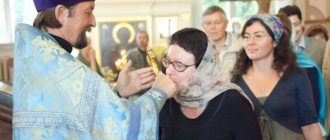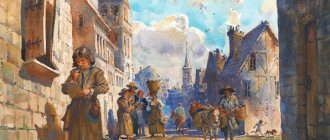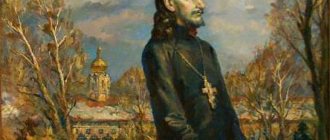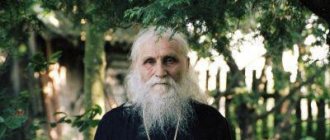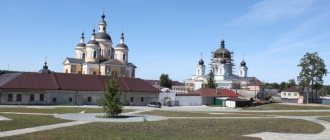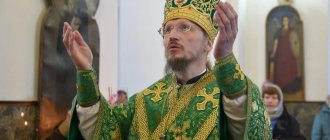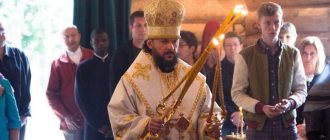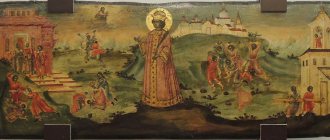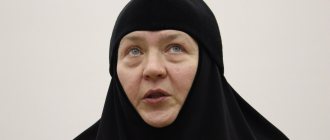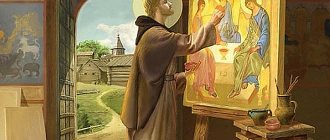Elder Pavel Gruzdev is revered in Moscow, St. Petersburg, the cities of Siberia and Valaam. His name is known to all Orthodox Christians. People came to Father Pavel from all over the country. People came to him for blessings and asked for help in healing from serious illnesses. He didn't refuse anyone. Archpriest Pavel Krasnotsvetov remembered Father Pavel with kind words; it was thanks to him that the outstanding stages of the priest’s life became known.
Pavel's childhood
The priest in the world bore the name Pavel Gruzdev. He was born in the Yaroslavl region in 1910. The elder’s homeland was the village of Bolshoy Borok.
Origin and birth
The boy's parents were peasants; in the pre-revolutionary years they lived very richly. They had a large plot of land, a good house, and a lot of cattle. Father and mother married in 1910. Before the war they had three children. The boy had two sisters. Pavel is the eldest in the family.
Family
From an early age he actively helped his parents. He knew how to care for livestock, understood beekeeping, knew the names and purposes of plants, and knew how to cultivate the land.
In 1914, my father went to war. The mother was left alone with the elderly and children. That time changed the usual way of life of peasant families. During his father's service at the front, the family was poor. Pavel, as the eldest, walked around the village, asking for bread for his mother and sisters, and carrying firewood from the forest on his back.
Teenage years and early life
The family was never able to restore their farm. The boy and his mother moved to live with their aunt in the monastery.
Life in the monastery
He remembered this period of his life with special love. In the monastery he worked in an apiary and mastered beekeeping. The boy grazed cows and horses and sang.
On January 3, 1930, the monastery was closed. Pavlusha moved to the Khutyn Monastery, which is located near Novgorod. Here he was dressed in a ryasophore and received the blessing of Bishop Alexy.
While in the monastery, the young man worked at the Derevyanitskaya shipyard, engaged in the construction of ships. After work, he sang in the monastery and rang the bells.
Work in the village
In 1932, the Khutyn Monastery also closed. Pavel returned to his homeland to his parents. Here he began working in the barnyard of the State Breeding Station.
At this time, an accident occurred at the Rybinsk Reservoir. The village fell into a flood zone. In 1938, Pavel and his father dismantled the frame of the house and floated it down the river to Tutaev. There they built a new house. The young man became a worker at the Zagotskot base and went to Leontief Church. He lived like this until 1941.
Arrest and exile
In May 1941, Pavel was arrested. Before his arrest, an unfamiliar young man came to his house and asked to spend the night. He was warmly received, but the guest turned out to be an NKVD employee. He needed information about the religious views of the owner of the house.
The very next day Gruzdev was taken to prison. He was subjected to severe abuse. The investigator knocked out all his teeth. But Gruzdev did not give up his faith even under terrible torture.
He spent many years in a labor camp near Vyatka. While serving his sentence, he wore number 513. Vera helped set up life in prison. Pavel was included in the category of political prisoners. They stayed away from those serving criminal sentences.
During his imprisonment he worked as a trackman. His duties included monitoring the condition of the railway tracks. Its main section was the road from the logging site to the camp. Gruzdev carried out his work very responsibly. Thanks to his position, he had the opportunity to go outside the camp and pick mushrooms and berries. The prisoners suffered greatly from a lack of vitamins; Pavel brought berries to his comrades to maintain their health. He collected and dried medicinal herbs himself.
One day a story happened that saved his life. In the fall, he went with his boss to check the routes. There was heavy fog and the road was not visible. At one point something got under the car's wheel. The boss began to shout at Gruzdev, accusing him of deception and dishonest work.
Returning to the camp, Pavel decided to check what happened on the rails. On the tracks he found a horse that had been hit by a train. The prisoner dragged her into a ditch. Not far away he saw the guy who was supposed to be driving the horses hanged. Pavel could not untie the rope. Then he began to pray, and the noose gave way. Gruzdev gave the guy a heart massage and artificial respiration. As a result, the hanged man was saved.
The rescued young man turned out to be German. For a long time he helped Pavel in prison. He shared bread with him every day.
Many priests served time in the camp. They really wanted to organize the Liturgy, but this was impossible in prison. The wife of the head of the pass issue helped conduct the service. She was very religious. The woman persuaded her husband to give the prisoners the opportunity to go into the forest and conduct a ministry. After the Liturgy, all the prisoners returned.
Pavel spent the last years of serving his sentence in Northern Kazakhstan. There he had to engage in the development of virgin lands. Thanks to his skills in working on the land, the young man was able to grow not only vegetables and grains, but also watermelons and melons.
Liberation and return to Tutaev
In 1953, Gruzdev was granted an amnesty. Prisoners were prohibited from moving freely around the country. Pavel's sister sent a telegram that their mother was dying. This made it possible to obtain permission to return to Tutaev.
Advent Story
Father Pavel Gruzdev believed that we should try to see the reflection of Christ in every person. He told this parable. There lived a woman in a certain village. She was a deeply religious person, observed all Orthodox traditions - she fasted regularly, constantly prayed and often went to church.
One day she had a dream in which she was told that the next day upon awakening, the Lord Jesus Christ Himself would come to visit her.
From early morning she put the hut in order, prepared delicious food - she cooked marmichel, fried eggs, baked a pie and sat down by the window to wait for the Savior.
A neighbor boy came to her and said:
“My mother is sick, she fell and can’t get up.” Let’s go, you can help,” and the woman answers him:
“I can’t, Jesus Christ promised to come to me,” the boy left with nothing.
The woman is sitting by the window again. Waiting. A fellow villager comes to her and asks:
— My cow is giving birth. You are the best at this matter. Let’s go, you can help,” and the woman said to him:
“I can’t, Jesus Christ must come to me,” the man also left.
It’s getting late in the evening, but the Lord still doesn’t appear. A wanderer turned into her yard and asked for an overnight stay, but she refused him too:
“I cleaned the house, prepared food not for you - Christ promised to visit me.”
The day ended, but God still did not come to her. She went to bed and dreamed of an angel. She asks him why God fulfilled his promises to her, and the angel answered:
- So He came to you three times, and you rejected Him.
- When?
— When the boy came to ask for his mother, when the man came whose cow was giving birth, and when the wanderer asked for an overnight stay.
Mature age
With the return to their native places, a new life began. For a long time he collected documents and completed rehabilitation.
Monastic tonsure
Since 1958, the future Archimandrite Pavel Gruzdev connected his biography with service in the church. In 1961, he was tonsured a monk by Archbishop Nicodemus of Rostov and Yaroslavl.
Since 1960, Gruzdev has been the rector of the Trinity Church in the village of Verne-Nikulskoye. Despite his fame, the holy father lived very modestly, dressed and ate simply, and did not make any savings during his life.
Church service
From 1983 to 1991, Gruzdev served as archimandrite at the Trinity Church in the village of Verkhne-Nikulskoye. He was highly respected by parishioners. People came to him to receive advice from academics to ordinary workers.
People came from all over the country for solutions to life's issues and healing. At the end of the 80s, the priest began to sharply lose his vision. Because of this, he was forced to leave the church in 1991. He began to live at the Resurrection Cathedral and receive people. Despite his illness and poor eyesight, Father Pavel conducted services.
last years of life
The last elder died on January 13, 1996. He was completely blind. There was no money at all, not even enough for medicine. The path to the place where Gruzdev is buried has not been overgrown for more than 20 years. Pilgrims from all over the country come here all year round to honor the memory of the elder.
Pilgrims
People came to Father Paul from all over the country. They asked him for advice, blessings, and healing from illnesses. He helped everyone.
So, one woman asked him whether to perform an operation on her newborn granddaughter, in whom doctors discovered a heart defect. The elder told her not to rush - to wait a little and boldly go to the operation. When six months later, on the eve of the planned treatment, the girl was examined again, not even traces of the disease were found in her.
Father was a great seer. There was a case when a certain woman approached him for a blessing. She hoped that the great elder Pavel Gruzdev could not see what kind of thoughts were in a person’s head, and what kind of feelings were in his heart. She needed a blessing to evict one of her relatives from the apartment. Father didn’t even cross her - he said: “Go away from where you came!”
Father Pavel not only spoke the beautiful Old Russian language, he spoke excellently in criminal, prison jargon. They say that in the early 90s, when the country was in complete disarray - no work, no food, constant gas and electricity cuts, monstrous inflation, when the rise in prices for the most necessary food products outpaced the rise in wages by several orders of magnitude, a group turned to him young men asking for help with advice on what to do, how to be and how to live? He very energetically, flavoring his speech with choice obscenities, advised them to return home, get married, have children and simply live, fearing nothing.
Elder Pavel Gruzdev could save a person from any ailment forever with just a friendly pat on the back. He did it without pretense, somehow even in a friendly way. He was a very simple man. I always considered it my duty to feed and shelter a pilgrim or an ordinary wanderer in need of help. He loved to repeat gospel parables and often accompanied them with stories from real life.
Gruzdev's advice
Communication with Father Pavel brought back life to even the most grief-stricken people; they became cheerful and cheerful. He always spoke simply to those who came to him, using aphorisms, short statements full of imagery, and Russian sayings in his speech.
One of the most important instructions is:
Conscience has no teeth, but it will bite to death.
Archimandrite Pavel
The worst thing, according to the priest, is to lose your conscience. He always said that a person without prayer is a bird without wings. You need to turn to God in a whisper every day.
He knew how to live, love, and taught this to those around him. The instructions were always simple in the old Russian style. He taught his parishioners to live without pride, in love for loved ones.
The Holy Father encouraged people to fast and pray modestly and quietly, so that no one would see. At the same time, fasting must be observed not only in food restrictions, but also spiritually.
Fast with the spirit, not the belly.
Archimandrite Pavel
Father talked about the need to try not to appear righteous in front of people. This must be done secretly, and then the Lord will reward and thank you for everything.
In the Leningrad canteen
In his stories, Father Pavel was not afraid to look funny and absurd. Thus, he loved to amuse his comrades with a story about how he had lunch in a Leningrad canteen. He visited this city often - he had many friends and acquaintances there.
He once came to Leningrad to visit Vladyka Nikodim. He was in a hurry on business, and suggested that Father Pavel, while he was away, go to some dining room and have lunch there. I gave the priest 25 rubles and left.
The old man went to look for a dining room. Some didn’t let him in because he was wearing felt boots, others because his tie didn’t meet the requirements. In the end, the priest found a canteen where they served set meals. He paid the money, took a tray of food, sat down at the table, put the suitcase under the chair and got ready to have dinner, but forgot to grab a spoon. There was nothing to do - I returned to the buffet, where cutlery was given out. He took a spoon and drank a glass at the same time. He went to his table and saw that some man was already sitting there and eating his soup. What to do? The priest pulled the second one towards him, broke the cutlet in half, and divided the mashed potatoes. I poured a glass of compote into two and began to eat my half. And the man looked at him silently all this time. Having finished his meal, the stranger got up and left. Father Pavel also had lunch and got ready to leave. Grab it, but there’s no suitcase. Stolen?! He looked around to see who to turn to, and under the next table he saw his luggage. The old priest realized that he had eaten someone else's lunch. He got scared, felt ashamed - he grabbed his belongings and ran across the road, in felt boots, in a long cassock, with a suitcase in his hand, and right at the red traffic light.
Writing activity
The priest wrote down his instructions. He had a wonderful gift of storytelling. With the life-giving power of his words, he could heal his interlocutor.
The priest's most famous books were:
- Collection of stories The happiest day.
- My dear ones.
Stories The Happiest Day is the story of a priest's entire life. One of the book's chapters bears the same title. In it, the holy father talks about one of his days in the camp. Young girls were brought to them. They were not fed for several days on the road, but were given bread just before their arrival. Pavel saw one young girl crying bitterly. It turned out that all her rations had been stolen for three days.
Gruzdev had his daily rations saved in the barracks. He brought it to the girl, but she did not take it, saying that she would not sell her honor. He handed the girl some bread and ran outside the zone to pray. All his life he remembered this day as the happiest of his life.
The collection of stories describes the most important events of Gruzdev. Starting from his birth to his last days. The elder never lost heart, despite everything he had to endure in life. He looked at everything with love, treated everyone with compassion and understanding.
The biography of the archimandrite is very difficult. He endured a lot of troubles and hardships without losing his faith. Prayer, sincere kindness and deep faith helped him survive and become a spiritual guide for believers.
Honey
In his book “My Relatives,” the priest recalls one incident. He was then about 10 years old. He wanted to eat honey, but Mother Superior, the abbess of the monastery, did not allow it. The boy took the rat from the trap, found a piece of rags, dipped it in a tub of honey and coated the caught animal with it. Taking the rat by the tail, he brought it to the abbess, showed it and said that he had caught the animal in a jar of honey. Mother began to lament - the product, after all, is now considered defiled and is not suitable for food. She told the boy to take the tub and take it outside the monastery. And he’s glad - the rat didn’t spoil the honey. He ate himself and treated the sisters to the nuns.
It's time to go to confession. Little Pavlusha is afraid, crying, but cannot hide the truth - he repented to his father and promised that he would not do this again. The priest absolved him of his sin, but asked if they had eaten everything? If not, then let Pavlusha pour a can for him too, and he will pray to God for it. No sooner said than done. I brought him some honey too.
